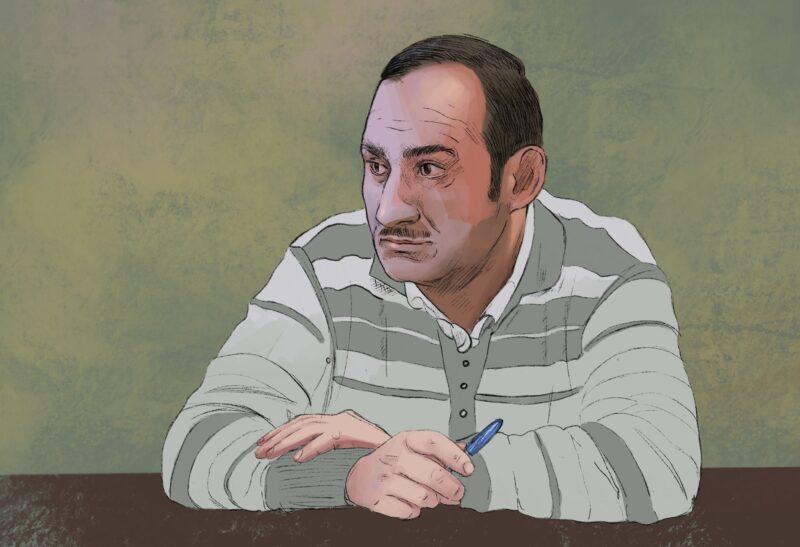Since late last year, the Azerbaijani government has escalated its actions against independent media outlets, leading to the arrests of journalists and civil society activists.
Currently, around 20 journalists are reported to be imprisoned in Azerbaijan.
These arrests have been portrayed to the public through specific narratives. Many of the detained journalists face accusations of smuggling, particularly related to the illegal import of foreign currency into Azerbaijan. Although these claims remain unconfirmed, pro-government media often label these journalists as involved in “grant smuggling.”
In several instances, these media reports serve as precursors to arrests, disseminating compromising information about individuals shortly before they are detained by law enforcement and hurting their presumption of innocence in several cases through these reports.
Media Involved in Disseminating These Reports
The dissemination of these reports is largely carried out by media organizations that are closely aligned with the government. These include several television channels such as ATV, REAL TV, Space TV, Public Television, ARB, AzTV (the state’s official channel), and Baku TV, which the government funds.
In addition to television, various print and online media outlets under official and unofficial government control contribute to this effort. These include state-affiliated outlets like the Azertaj agency, Khalq newspaper (the official publication of the Presidential Administration), Azerbaijan newspaper (the official publication of the Milli Majlis), and several other newspapers and online platforms such as Yeni Musavat, 525ci, Sharq, Iki Sahil, Turkustan, Report, APA, Lent.az, Trend, Qafqazinfo, and others.
These outlets often publish content suggesting that some Western entities are using independent media to destabilize Azerbaijan. These articles’ content, text, and rhetoric across different outlets are remarkably similar, leading to suspicions that they may originate from the same sources.
Case Analysis
An analysis made by Meydan TV of two articles published on April 18 and 22 by media close to the government highlights these similarities. Both articles claim to reveal “new facts in the case of Abzas Media and Toplum TV.” Despite appearing in different outlets, the articles feature identical sentences and rhetoric, with only minor rearrangements of paragraphs, further suggesting a coordinated effort. You can see the text comparisons in the Azerbaijani version of this article.
The content of these articles often includes detailed allegations about the financial sources and budgets of the media organizations where the arrested journalists work. They also frequently call for the arrest and punishment of journalists and civil society representatives, echoing the charges that the arrested individuals later face.
Response from Independent Media
Independent media and civil society have pushed back against these accusations, arguing that the presumption of innocence is being violated. Lawyers and experts have taken these cases to court, seeking to prove that the allegations are baseless. When local courts fail to provide an objective investigation, they turn to the European Court of Human Rights.
A close examination of the articles suggests they are formulaic, with identical rhetoric and accusations, further supporting the view that they are coordinated and premeditated.
Legal Challenges
One of the arrested journalists, Hafiz Babali, has filed a lawsuit against ATV TV channel, accusing it of spreading slanderous and insulting content that harmed his reputation. Although his initial lawsuit was dismissed by the Sabail District Court, Babali has appealed the decision. His legal team argues that the claims against him are false and that his journalistic work was not influenced by foreign donors. They also contend that the media outlets in question should not be absolved of responsibility for spreading defamatory content.
The legal challenge highlights gaps in the local legislation regarding the presumption of innocence, as noted in a report by the Institute of Democratic Initiatives (IDI). The report points out that while the presumption of innocence is enshrined in Azerbaijani law, there are no clear consequences for violating this principle, allowing local media to continue publishing such content without repercussions.
Background on Recent Arrests
Since November 2023, the wave of arrests in Azerbaijan has targeted up to 20 journalists and social activists, starting with individuals associated with “Abzas Media.” This includes the arrest of the site’s director, Ulvi Hasanli, employee Mahammad Kekalov, and editor-in-chief Sevinj Vagifqizi. The crackdown later extended to journalists affiliated with “Toplum TV,” including the channel’s founder Alasgar Mammadli.
Local human rights organizations estimate that there are currently between 250 and 300 political prisoners in Azerbaijan. However, Azerbaijani officials maintain that no one in the country has been arrested solely for their professional activities or political reasons.



